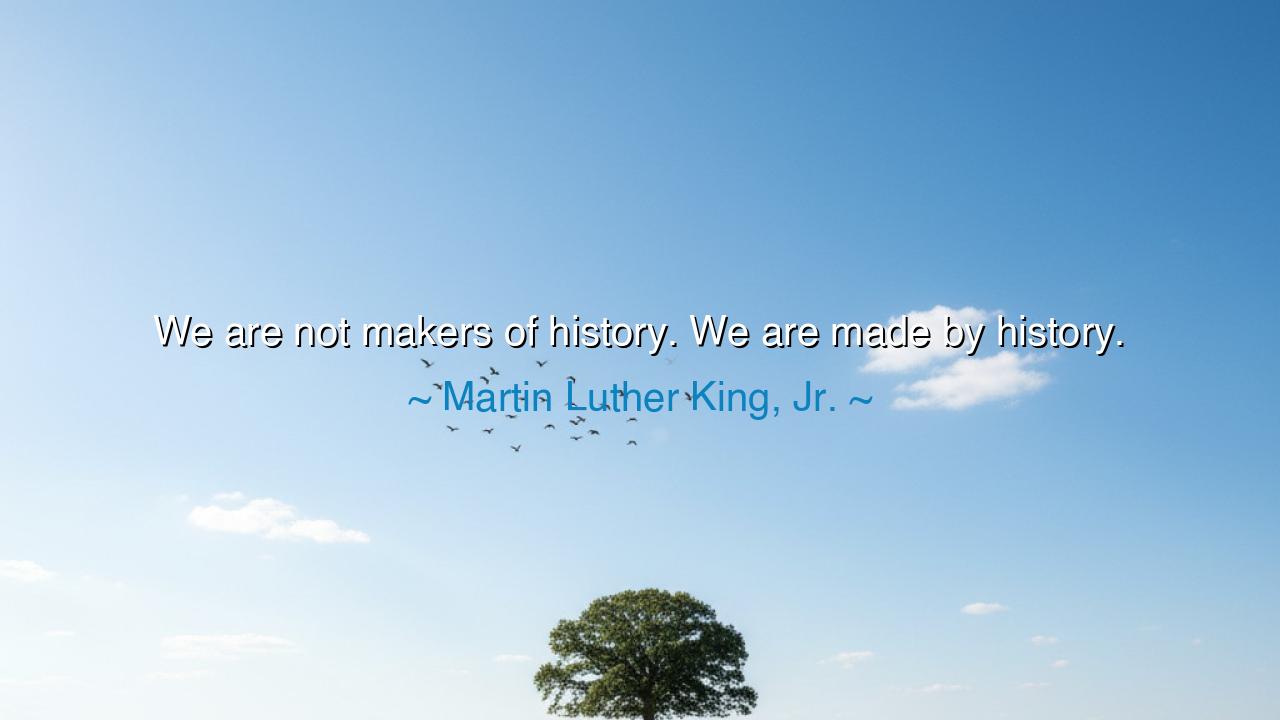
We are not makers of history. We are made by history.






The great prophet of justice and peace, Martin Luther King, Jr., once spoke these words of profound humility and truth: “We are not makers of history. We are made by history.” In this declaration lies a wisdom as old as time itself — that every human being, no matter how mighty or meek, stands upon the foundations laid by those who came before. We are born into stories already unfolding, inheritors of struggles, dreams, and legacies that shape our thoughts, our actions, and even our sense of self. To be made by history is to recognize that we are the children of time — shaped not by our own will alone, but by the great and mysterious current of all who have lived and striven before us.
When Dr. King spoke these words, he stood in the midst of one of history’s great turning points — the Civil Rights Movement. His life’s work was devoted to justice, but he knew that he was not creating justice from nothing. He stood upon the shoulders of giants — of Frederick Douglass, Sojourner Truth, Booker T. Washington, and countless unnamed souls who endured bondage, humiliation, and struggle. The courage he carried did not spring forth in isolation; it was forged in the fires of centuries of oppression and resilience. Thus, his words were not an admission of powerlessness, but an expression of reverence — a recognition that history is the sculptor, and we are its clay.
To say that we are made by history is also to acknowledge that our beliefs, our values, even our fears, are born from the world we inherit. The wars fought before we were born, the revolutions that reshaped nations, the discoveries that changed how we think — all flow into the present moment, shaping who we are. Just as a river carries the minerals of the mountains it has crossed, so too do we carry within us the spirit of those who came before. The ideas of equality and freedom, for which Dr. King lived and died, were not inventions of his time; they were the living continuation of humanity’s eternal yearning for dignity — a yearning older than empires, deeper than nations.
Consider the story of Nelson Mandela, who, decades after King, led South Africa from the darkness of apartheid into the light of reconciliation. Like King, Mandela understood that he was part of a story larger than himself. His struggle was not his alone; it was the culmination of the sacrifices of countless others — of the miners, the mothers, the teachers, the nameless millions who had borne injustice with unbroken faith. When Mandela walked out of prison after twenty-seven years, he did not see himself as a conqueror, but as a witness to history’s long arc toward freedom. He, too, had been made by history, molded by suffering and patience into the leader his people needed.
And yet, Dr. King’s words carry a deeper paradox. If we are made by history, we also bear the duty to understand and redeem it. History may shape us, but we, in turn, give it meaning. The past is not dead; it breathes within us, waiting to be transformed by wisdom and compassion. To know that we are made by history is to realize that we are responsible for what comes next. Just as our ancestors’ choices formed the world we now inhabit, so too will our choices shape the generations to come. We are not passive products of time; we are its stewards. The clay may have been shaped, but the potter’s hand is ours now.
In his own life, Martin Luther King, Jr. demonstrated how one can honor history without being enslaved by it. He took the ancient moral laws of love, forgiveness, and justice — truths echoed by prophets and philosophers across ages — and gave them new life in a world consumed by hatred and division. He transformed the inheritance of suffering into a legacy of hope. Through his example, he showed that to be made by history does not mean to be bound by it, but to rise from it — as the phoenix rises from ashes, bearing in its wings the lessons of the past.
So, my listener of the future, let these words be carved into the tablet of your heart: “We are not makers of history. We are made by history.” Remember that you are the heir of countless lives — that your freedoms, your knowledge, your very breath were purchased by the endurance of others. Honor their struggles by learning from them. Study the past not as a chain, but as a guide. Let it teach you humility, for you stand upon sacred ground — the ground of memory. And let it teach you courage, for the story of humanity is not yet complete.
For in truth, we are both made by history and making it. Every act of kindness, every choice of justice over cruelty, every stand against ignorance writes a new line in the book of time. History shapes us — but we, too, shape history. And perhaps that is what Martin Luther King, Jr. wished us to see: that the noblest way to honor the past is to live so that future generations may be proud of the history they inherit.






AAdministratorAdministrator
Welcome, honored guests. Please leave a comment, we will respond soon